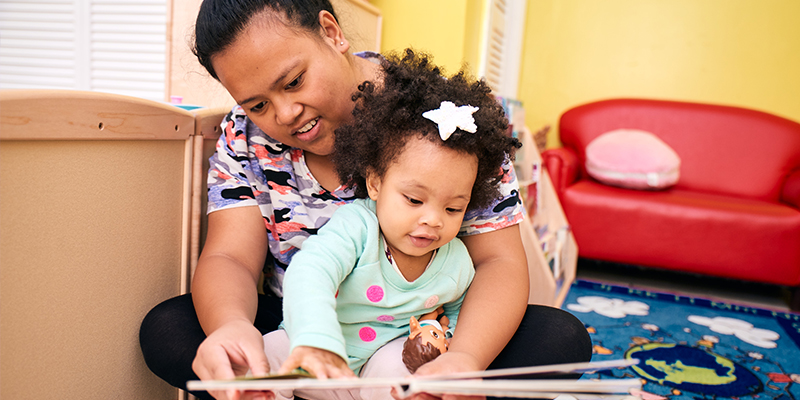We’re thankful for the actions the Mayor and DC Council have taken to date to support families and child care businesses as the COVID-19 pandemic continues to impact the District. It’s clear though that more must be done to keep our child care providers in business.
Child Care Providers Speak Out
Last week, the Under 3 DC Coalition conducted virtual town halls with nearly 100 center and home-based child care small business owners and educators. In these town halls, owners conveyed both extreme anxiety about the viability of their businesses without tuition payments and extreme guilt over continuing to charge parents who are also facing financial hardship right now.
Some of the statements they shared include:
- “I can’t stay closed because it’s going to be financial suicide for me.”
- “We certainly want to keep paying our teachers, as well as our fixed costs, but can’t consciously do so on the backs of struggling parents.”
- “If I don’t open, I won’t be able to pay my loans, my rent, my taxes that are due [for my business]…My staff are willing to work but I’m also thinking of their safety as well…we know children are carriers of this virus so what happens if opening leads to one of [our staff] falling ill?”
A Child Care Stabilization Package is Vital
Our coalition is now urging the government to take additional actions immediately to stabilize the critical child care sector in the District of Columbia. The approximately 474 licensed center and home-based child care businesses serve over 37,000 young children under age 5. We outlined our recommendations in a letter to Mayor Bowser for a child care stabilization package. Our requests are based on the needs articulated by DC child care providers in our virtual town halls.
The child care stabilization package should include:
- Relief grants for the licensed center and home-based child care businesses serving young children under age 5.
- Incentives for child care businesses offering child care to emergency and essential workers.
- Gap-filling in reimbursements to providers for waived family copays.
Child Care is Particularly Vulnerable Right Now
Child care is an essential service in the District; one that is critical to ensuring that first responders to this pandemic are able to serve our community. Under usual circumstances, child care is an industry that operates on tight financial margins, and this pandemic brings the challenges of providing child care into sharp focus. As COVID-19 continues to wreak havoc on the financial stability of our already vulnerable small businesses, the District must act to prevent irreversible harm to the supply and workforce pipelines of our child care sector.
While the District has already implemented measures to protect the solvency of child care providers who participate in the child care subsidy program – and we are deeply grateful for continued payments administered through OSSE – those home and center-based care settings who receive their revenue either primarily or partially through privately paid tuition are in an impossible economic position.
Without Relief Grants Our Child Care Industry Will Be Decimated
Existing relief funding for small businesses is inadequate and, without intervention, our child care industry will be decimated. Center based and family home child care providers who do not participate in the subsidy program and/or rely in part on private tuition exist in every ward of the District and are on the brink of permanent closure as a result of this pandemic. Losing these care offerings would, in the short term, prevent parents from getting back to work and reinvigorating our economy. And, in the long term, it would diminish our already limited supply of child care slots creating greater strains on affordability and accessibility, furthering displacement of young families.
Grants should authorize child care businesses to cover the costs of rent, insurance, utilities, cleaning and safety supplies, payroll (as needed), and unexpected costs related to operating through COVID-19. They should retroactively cover losses for March for providers who were not able to access general small business grants and also be forward looking for at least four months. Request: $5.6 million per month.
All Offering Child Care to Emergency and Essential Workers Deserve Hazard Pay
All child care workers and educators should be receiving hazard pay of time and a half for their services during the public health crisis. OSSE should pay hazard wages through an increase to the provider’s regular subsidy reimbursement rate. Or, for privately funded facilities, child care businesses should be able to apply for grants that will reimburse them for the cost of hazard pay increases as well as the costs of reopening a business, such as enhanced maintenance and cleaning protocols.
Further, centers providing emergency care need access to personally protective equipment and ample cleaning supplies. Child care is an essential business and therefore the District government must take responsibility for obtaining and disseminating these supplies. Request: Cover these costs utilizing recently allocated federal assistance.
Waived Family Copays Create Gaps That Must Be Filled
To further prevent permanent child care closures, OSSE should reimburse Level II providers for the waived family copays to ensure these facilities are made whole during this time. Request: Cover these costs utilizing recently allocated federal assistance.
Mental Health Support is a Critical Need
The District must provide mental health support. In the Under 3 DC virtual town halls, child care educators expressed high levels of distress about COVID-19 and a need for mental health support for directors, staff, and caregivers. Providers described their daily fear and anxiety about being exposed and exposing members of their family and their broader community to the virus. One provider described bursting into tears because of the stress and mental strain of worrying about the children in her program, their parents, and her own business: “I had a health care worker [parent] who thought that she was infected. I was totally upset – scared and crying, thinking to myself this is too much! I was truly thinking about closing on Monday. I received a call that she was not infected. I need mental health support.”
Providers Still Working Need COVID-19 Specific Safety Guidelines
OSSE must develop and share child care specific safety guidelines for providers who are still serving families. Many center and home-based child care businesses remain uncertain about how to care for children safely as COVID-19 spreads in the District. While OSSE has released some guidance about health and safety, caring for infants and toddlers necessitates close contact to ensure quality and these unique conditions are not addressed by current guidance. Providers have voiced a need for more detailed safety guidance tailored to a child care setting for infants and toddlers during this public health emergency.
Government Leadership is Needed to Initiate Public-Private Partnerships
We believe there is interest among the region’s philanthropic community in partnering with the District to support these efforts, but government leadership is needed to initiate such public-private partnerships. To support our requests, we urge the District to use the $5 million that the Federal CARES Act allocates to the District for child care operations through the Child Care and Development Block Grant. Remaining costs should be met through bold allocations of local and/or federal funding such as publicly committing to dedicate some of the $495M from the Federal Coronavirus Relief Fund to these initiatives to signal to philanthropic partners our dedication to preventing catastrophic permanent damage to the District’s child care sector, working families, and the local economy as a whole.
Now is the time for bold leadership. We’re proud to give voice to the early care and education workforce of our city and look forward to the response and action on these vital matters.


